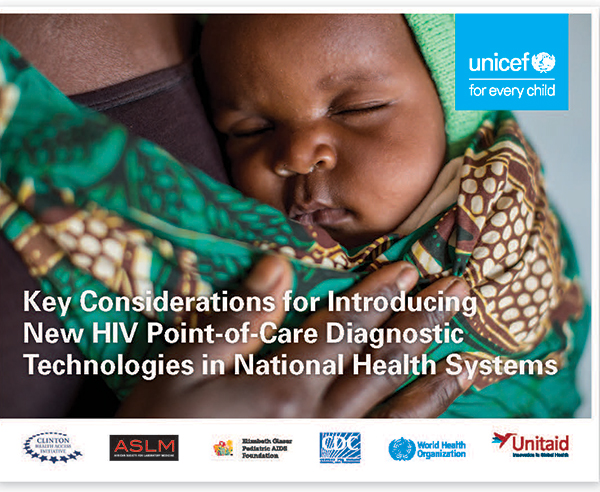 Global health partners are pleased to announce the launch of two important resources for countries implementing HIV molecular testing: Key Considerations for Introducing New HIV Point-of-Care Diagnostic Technologies in National Health Systems , and the HIV Point-of-Care Diagnostics Toolkit
Global health partners are pleased to announce the launch of two important resources for countries implementing HIV molecular testing: Key Considerations for Introducing New HIV Point-of-Care Diagnostic Technologies in National Health Systems , and the HIV Point-of-Care Diagnostics Toolkit
With the increasing availability and rapidly growing interest in point-of-care (POC) molecular technologies for early infant diagnosis (EID) and viral load (VL) testing, many countries in Africa have introduced and are scaling up routine POC EID, and are also considering the targeted use of POC VL testing within their national health programs. These include countries such as Cameroon, Cote d’Ivoire, Democratic Republic of the Congo, Ethiopia, Kenya, Lesotho, Malawi, Mozambique, Rwanda, Senegal, South Africa, Swaziland, Tanzania, Uganda, Zambia, and Zimbabwe.
- Key Considerations for Introducing New HIV Point-of-Care Diagnostic Technologies in National Health Systems is available in both English and French and covers an array of topics across the planning and implementation continuum of POC HIV diagnostics, including policy and framework development; strategy and planning; regulations; quality assurance and data management; procurement and supply chain management; and monitoring and evaluation.
- HIV Point-of-Care Diagnostics Toolkit contains various practical tools and guidance to support countries with planning and integration of POC HIV diagnostics into national laboratory networks. Developed through a joint inter-agency consensus-building process and hosted by the Learning Collaborative on UNICEF’s Children and AIDS website, the Toolkit currently consists of four modules: Product and Site Selection; Forecasting and Supply Planning; Regulations; and Quality Assurance. Additional modules are under development.
For more information Click here

